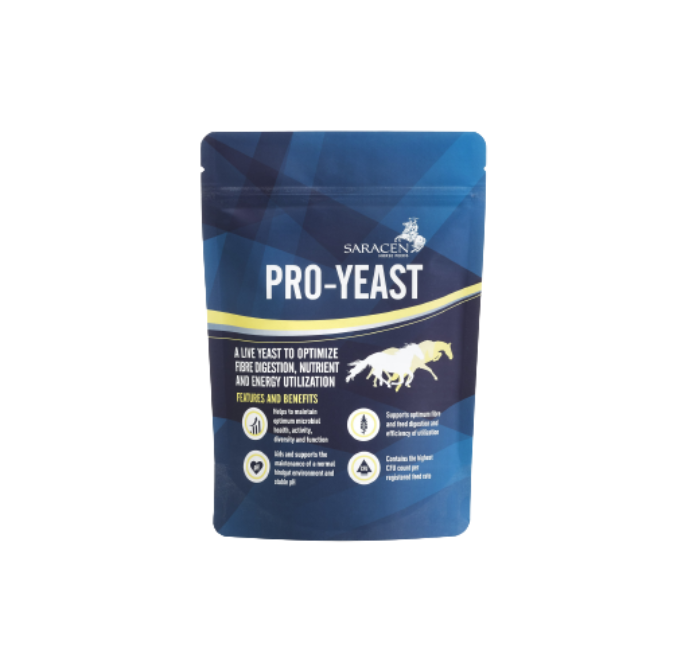Stress And The Hindgut.
Recent research within other animal species and the investigation of the link between bacterial populations of the hindgut and other health issues has prompted a rise in research studies within horses.
YOUR HORSE'S HINDGUT
The hindgut of the horse is responsible for the fermentation of fibre, which relies on billions of protozoa, fungi, and bacteria. This fibre fermentation leads to the production of volatile fatty acids (VFAs) which the horse can then convert for energy. This energy is then used for all bodily functions, performance and the maintenance of good body condition.
The microbial populations of the hindgut are highly sensitive to change, and risks which may influence the number and diversity present include :
- High starch diets
- Stressful events
- Changes to feed or forage
- Rich grazing
- Lack of fibre / forage
Symptoms of poor hindgut health include poor appetite, weight loss, loose droppings, colic and the development of stereotypical behaviours such as crib-biting.
The impact of stress.
Both physical and mental stress has been linked to alterations within the microbial populations within the hindgut. In horses who display stereotypical behaviours such as crib-biting, or hyper vigilance and anxiety, research has also found a lack of diversity within the hindgut.
Horses who experience levels of stress when travelling, exercising or as a result of diet changes may therefore benefit from supplementation of prebiotics in order to maintain their hindgut health.
Recent Research
Research by Ganda (2023) looked into the impact of a Saccharomyces cerevisiae fermentation product and how it influenced the hindgut microbiome during periods of stress. 20 horses were put under a 'stress challenge,' which simulated travelling. At the end of the study, horses who were supplemented with the post-biotic had significantly more robust microbial diversity following the stress period than those who received no supplementation at all.
To expand upon this research, another study investigated the link of gut microbes and behaviour. Animals who were found to have a more diverse and established gut microbiome were less likely to react to stress stimuli than those animals who did not display the same diversity. This link may be explained by the hormones produced by specific gut microbes, such as seretonin and dopamine. These hormones are well recognised for their link to behaviour, such as reducing the likelihood of anxiety and depression, as well as providiing a 'feel good factor,' of satisfaction and pleasure.
A further study also found that horses receiving a Saccharomyces cerevisiae fermentation supplement displayed reduced cellular stress following prolonged exercise. Cytokines which are seen as a marker of stress and inflammation were found to be in lower concentrations in the supplemented group, and also returned to pre-exercise concentrations more quickly than the control group who received no supplementation (Valigura et al, 2021).
how to support your horses hindgut health.
- Ensuring that plenty of forage is available is ideal, as this will ensure the horses hindgut factory is always in operation mode.
- Make changes to both forage and feed slowly to give the microflora time to adjust to new feedstuffs.
- Keep meal sizes small, not exceedingly more than 2kg per meal size.
- Do not exceed more than 1g for every 1kg of body weight in starch per meal.

PRO-YEAST
Saracen PRO-YEAST is a research-proven, live yeast additive that provides a probiotic effect which will help to optimize fibre digestion, nutrient, and energy utilisation. It is suitable for all types of horses and ponies and is particularly useful for performance horses to help maintain optimal microbial health whilst supporting and maintaining a normal hindgut environment and stable hindgut pH.
Saracen PRO‐YEAST works by competing with the lactic acid-producing microorganisms that thrive in a low pH environment, to reduce the additive acid load whilst also removing oxygen from the hindgut. This process makes the hindgut environment more desirable to fibre digesting bacteria which then encourages the proliferation and activity of these microorganisms. The proliferation of fibre‐digesting bacteria leads to an increase in energy supply via volatile fatty acid production which will have a direct effect on health and performance.
Equinews
Stay up-to-date with the latest version of Equinews, a digital newsletter from Kentucky Equine Research












